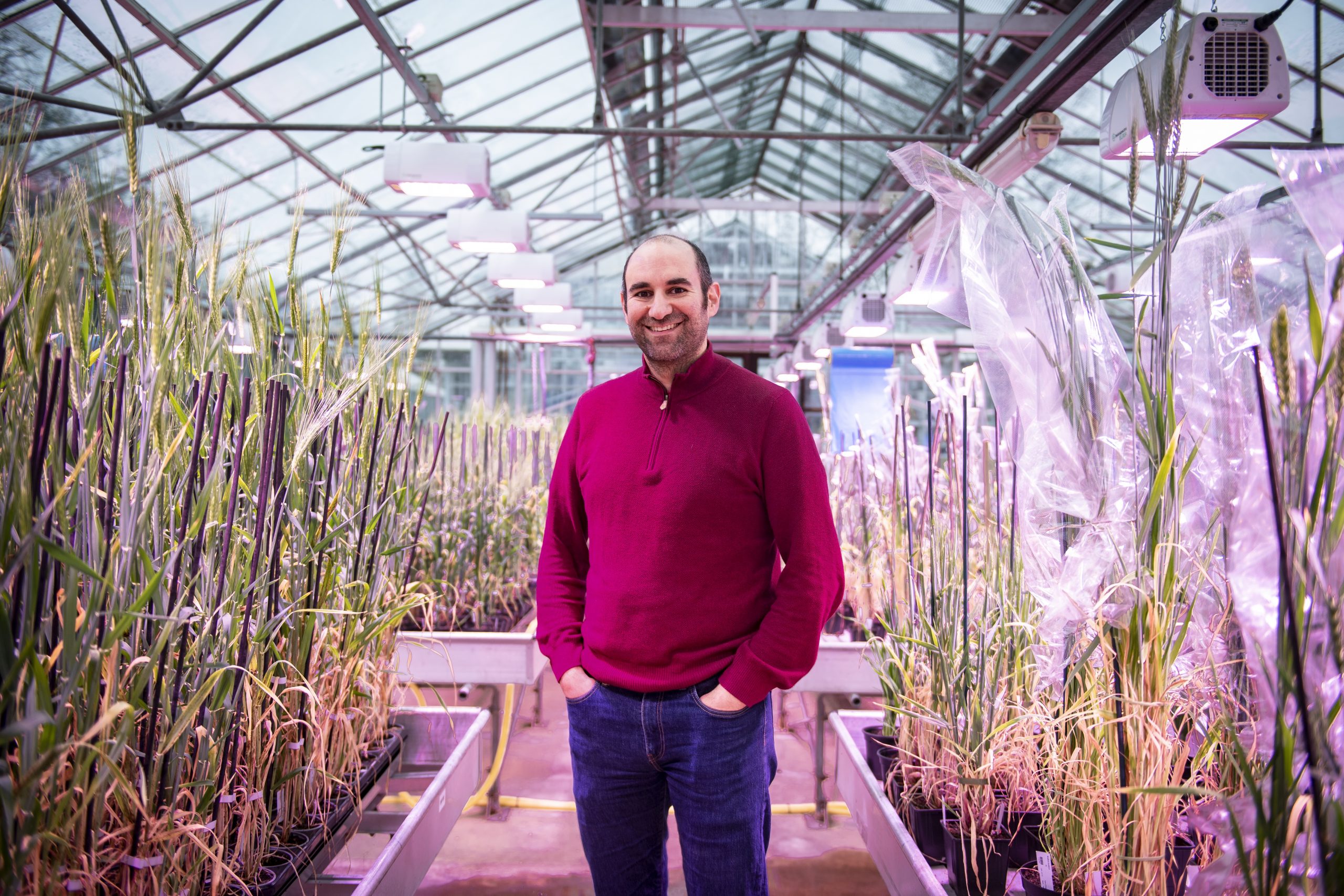
Dr. Cristobal Uauy of the John Innes Center, UK.
By Phillip Vines, assistant professor of turfgrass breeding, Department of Plant Biology
The 30th Anniversary Rutgers Turfgrass Symposium was held on March 18 and livestreamed as a virtual event. The theme for this year’s symposium was, “Advances in Turfgrass Science: Looking to the Future.” Although the Turfgrass symposium is an annual event, this was the first time it was offered in an online format. The symposium was an overwhelming success, bringing together great speakers, discussions and interactions. There were 374 participants from 18 countries and 34 states from within the U.S. who registered for the event. Laura Lawson, interim executive dean of the School of Environmental and Biological Sciences and interim executive director of the New Jersey Agricultural Experiment Station, welcomed attendees and shared some of the exciting news about the school and the experiment station.
The opening session, which was moderated by Bingru Huang, distinguished professor in the Department of Plant Biology, focused on “New Technologies for Turfgrass Breeding and Management.” Rong Di, associate research professor in the Department of Plant Biology, made the first presentation, titled “Application of CRISPR-gene editing and tissue culture to improve creeping bentgrass.” Josh Friell, senior research scientist at The Toro Company, gave the second talk on the topic, “New technologies for optimizing turfgrass management.” Phillip Vines, assistant professor in the Department of Plant Biology, followed with the presentation, “Applications of high-throughput plant phenotyping in turfgrass breeding.” The final presentation of the first session, “Decision support system – Collect, analyze, deploy, and integrate edge solutions for the food and beverage industry,” was given by Naveen Singa, a researcher at Siemens Technology.
The keynote address, delivered by Cristobal Uauy, a group leader at the John Innes Center in the United Kingdom, was titled, “Unlocking the polyploid potential in crops through genomics.” Stacy Bonos, professor of turfgrass breeding and associate director of the Rutgers Center for Turfgrass Science, served as the moderator for the keynote session. A poster session followed the keynote address. A total of 18 poster presentations on a variety of topics related to turfgrass science were given by faculty, staff and graduate students from Rutgers, including authors Cathryn Chapman, Katie Diehl, William Errickson, Patrick Fardella, Glen Groben, Joseph Heckman, Sean McBride, Thomas Molnar, Bradley Park, Jeanne Peters, Stephanie Rossi, Anna Luiza Sousa, Trini Taccad, Christopher Tkach, Phillip Vines, Shidi Wu, Zhongqi Xu and Pingyuan Zhang.
The closing session included four presentations focused on Pest Management and was moderated by William Meyer, professor of turfgrass breeding and the inaugural C. Reed Funk Endowed Faculty Scholar in Plant Biology and Genetics at Rutgers. Matt Elmore, assistant extension specialist in weed science in the Department of Plant Biology, started the session with a presentation titled, “Goosegrass resistance to dithiopyr.” Another goosegrass related talk, “Identifying the mechanism of oxadiazon resistance in goosegrass and improved understanding of PPO-inhibitor mode of action,” was given by Scott McElroy, a faculty member in the Department of Crop, Soil, and Environmental Science at Auburn University. The third presentation of the final session was from Pingyuan Zhang, graduate assistant in the Department of Plant Biology, whose talk was titled, “Interpretations of a logistic regression model for fungicide control of dollar spot on creeping bentgrass.”
The final presentation was made by Bruce Clarke, extension specialist in turfgrass pathology in the Department of Plant Biology, on “Developing turf disease control programs that are efficacious and environmentally sound.” A special slideshow tribute was presented at the conclusion of the symposium to honor Clarke for his 40 years of contributions to education, research and service in turfgrass science at Rutgers and beyond.
Rutgers Center for Turfgrass Science is grateful for the participation of the many friends and colleagues at the state, regional, national and international levels. Rutgers Turfgrass Symposium was founded on the principles of sharing ideas and engaging in discussions pertaining to current and future research, and the level of participation and interaction at this year’s virtual event helped to ensure those traditions will be continued for future symposia. All oral and poster presentations from the 30th Anniversary Rutgers Turfgrass Symposium were recorded and available on the Rutgers Center for Turfgrass Science website.
A great deal of appreciation is owed to the Symposium Organizing Committee, comprised of Rong Di, who served as the chair, Stacy Bonos, Bruce Clarke, Matt Elmore, William Meyer and Jim Murphy, as well as Phillip Vines and Barbara Fitzgerald, who served as co-editors of the Symposium Proceedings. The committee assembled an excellent event, despite ongoing concerns centered around the COVID-19 pandemic. In addition to the organizing committee, there are many other individuals to thank for helping to make the event a success, including Bernard Ward and Alanna Perez for providing technical support for the live streaming of the event. Special thanks to Bruce Clarke, Rong Di, Anne Diglio, Barbara Fitzgerald, Jim Murphy, Casey Noon, Cece Peabody, Phillip Vines and Phil Wisneski for their administrative and technical assistance in developing and advertising the event as well as publishing recordings of the video poster presentations to the center’s website.
Posted with permission from the New Jersey Turfgrass Association (NJTA). This article first appeared in the NJTA Clippings Newsletter Vol 105 (1): 13-14 on April 12, 2021.

